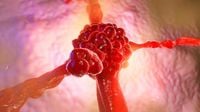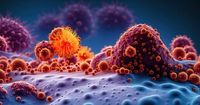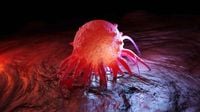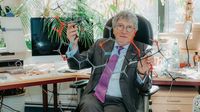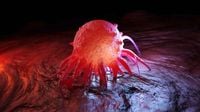In a groundbreaking development in cancer research, chemists at the Otto-von-Guericke University Magdeburg have successfully synthesized Disorazol Z1, a potent natural substance that has shown promise as an anti-cancer agent. This achievement, announced on April 2, 2025, marks a significant milestone in the quest for effective cancer treatments.
Disorazol Z1, typically produced by bacteria found in organic waste such as goat manure, has been under investigation for its ability to prevent cell growth and induce cell death. The research team, led by Professor Dieter Schinzer, described their work as a "scientific sensation," emphasizing the importance of this synthetic production.
"The substance is extremely active," Schinzer explained in a statement, noting that they worked with picomolar concentrations—meaning twelve zeros after the decimal point. Due to its high potency, the team initially produced only two milligrams of Disorazol Z1, employing strict safety measures including gloves, masks, and closed fume hoods during the synthesis process. "If we had produced larger quantities, it could have had health consequences," he added.
The ability to artificially produce Disorazol Z1 is a game-changer in cancer therapy. Previously, this compound could only be harvested from bacteria in their natural environment. Now, researchers can modify and optimize the substance for specific medical applications, such as targeting tumor cells while sparing healthy cells. This targeted approach could revolutionize how cancer treatments are developed and administered.
"We have imitated nature, but with a crucial advantage," Schinzer said. "Bacteria produce Disorazol Z1 in only a specific form, while we can adjust it for medical applications." The next steps for the research team involve collaborating with industry partners to further develop the substance, ensuring it targets cancer cells effectively while leaving healthy cells largely unharmed.
As the team prepares for the next phase, which includes rapid patenting and publication of their findings, the project has received significant financial backing, amounting to approximately 1.7 million euros from state funds and the European Regional Development Fund (EFRE).
However, not everyone is ready to celebrate this breakthrough. Professor Jutta Hübner, an expert in Integrative Oncology at Jena University Hospital, expressed caution regarding the implications of this discovery. "Honestly, it is always sobering to see what hopes such reports can raise," she stated. Hübner emphasized the need for thorough testing in laboratories and on animals, followed by clinical trials with human patients before Disorazol Z1 can be considered a viable treatment option.
While the initial results are promising, experts warn that the path from laboratory discovery to real-world application is long and fraught with challenges. "The crucial question is: does this really help patients?" Hübner asked, highlighting the uncertainty that still surrounds the potential of Disorazol Z1.
As the scientific community eagerly watches the developments surrounding this synthetic compound, the hope remains that it could herald a new era in cancer treatment. The research team’s innovative approach to modifying Disorazol Z1 may lead to therapies that not only combat cancer more effectively but also minimize damage to healthy tissue.
The implications of this research extend beyond the laboratory. If successful, the synthetic production of Disorazol Z1 could pave the way for new, more effective cancer treatments that are tailored to the individual needs of patients. The potential for personalized medicine in oncology could significantly improve patient outcomes, making this discovery one to watch closely in the coming years.
As the project progresses, the collaboration between researchers and industry will be crucial in navigating the regulatory landscape and ensuring that Disorazol Z1 can transition from a laboratory novelty to a practical treatment option for cancer patients.
This breakthrough not only underscores the importance of ongoing research in the fight against cancer but also highlights the innovative spirit of scientists dedicated to finding solutions to one of humanity's most pressing health challenges. With each step forward, there is hope that a once-distant dream of effective cancer therapies may soon become a reality.
